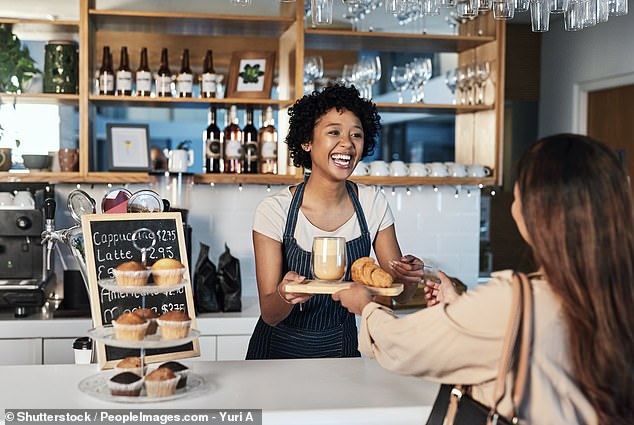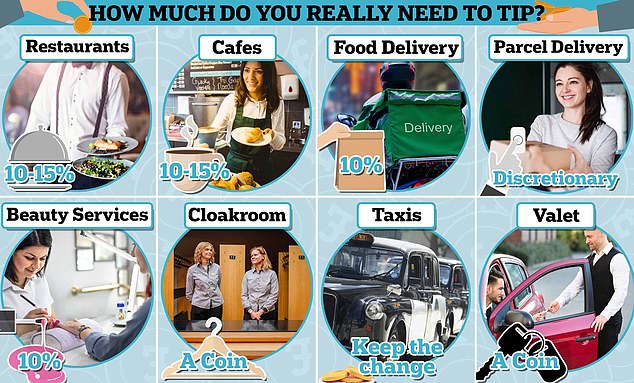How much to tip, especially when the service charge is already included, is something that is a constant source of bewilderment for Brits.
From today, service workers in the UK will be legally entitled to keep 100 per cent of the money they have earned through tips, generating an additional £200 million for workers.
Under the new rules, tips left in cash or paid by card, as well as service charges applied in restaurants, cafes, hotels, hairdressers or taxi companies, must be passed on to staff.
But how much is the right amount to tip? And should you tip if you’ve received mediocre service or only when it’s exceptional?
Laura Akano, etiquette coach and founder of Polished Manners, said tipping is never required in the UK, but it is “a nice thing to do.”
Femail reveals here how much to tip at the hairdresser, cafe or restaurant.
Restaurants and cafes: 10 – 15 percent
Many restaurants in the UK, especially in London and other big cities, now include a service charge on the bill, usually 12.5 per cent.
If this hasn’t been added automatically, according to etiquette experts Debrett, the minimum you should offer is 10 percent.
“Many restaurants include service, in which case tipping is not necessary except for exceptional service,” the guide says.
“It’s traditional to leave 10 percent, but nowadays it’s common to leave up to 15 percent for good service.”
Laura Akano, etiquette coach and founder of Polished Manners, told Femail that tipping is never necessary in the UK, but it is “a nice thing to do.”
‘What I have observed is that many restaurants automatically add between 12.5 and 15 percent.
‘Based on that, from an etiquette point of view, I wouldn’t tip extra, unless you’re feeling generous or you’ve received exceptional service.
“But there is no obligation, in England it is not mandatory, wherever you go.” It’s okay to discount the service charge.
“While it’s not required, I would say if you can’t afford a tip, consider not going out.”
Jane Pendlebury, chief executive of HOSPA, the Hospitality Professionals Association, told FEMAIL: ‘While there are no hard and fast rules for tipping, there are some general guidelines that can help.
“In restaurants, a service charge of between 10 and 15 percent is often added to the bill.
‘If it is included, there is no need to tip unless the service was exceptional. However, if no service charge is added, it is customary to tip a similar amount.
Bars: round up or £1 to £2

Experts suggested tipping up to 10 percent in cafes (file image)
Anyone who has visited the US will know that you should tip your waiter for serving your drink, but the same practice has not spread to the UK.
Jane Pendlebury of HOSPA said: ‘In bars, tipping is not so common just for drink orders.
“But if there is table service or the waiter has gone above and beyond, a small tip or rounding up the bill is appreciated.”
Coffees: round up the bill or leave a few kilos
“When it comes to cafes and casual dining, it is perfectly acceptable to leave a small amount, say £1-2 or round up to the nearest pound, as these establishments may not always add a service charge.
‘Tipping higher for exceptional service is always appreciated, and conversely, if service was poor, reducing your tip or leaving none at all sends a message, although it’s often better to give feedback directly.
‘Nowadays, there isn’t much difference between tipping with cash or card, although many in the industry appreciate cash tips as, traditionally, they went directly to staff.
‘However, the new legislation will remove the need to take this into account – 100 per cent of tips will now go to staff.
‘In terms of location, tips in larger cities like London may be slightly higher due to higher living and food costs, but the percentage range remains largely the same.
‘In addition, in London hotels it is not unusual to see a percentage added to the entire stay, mainly accommodation. Typically, this is 5 percent, but sometimes it is higher.
Taxis: round up or keep the change
“If you pay cash, you could say keep the change or round up to the nearest pound,” says Laura Akano.
Ride-hailing apps offer the option to tip the driver, making it easy to add an extra pound at the end of your ride.
Food delivery services: 10 percent
Thanks to the rise of apps like Deliveroo and JustEat, people are regularly getting restaurant food delivered to their door.
And that means the same etiquette applies to tips.
Even if you’re eating on your couch, rather than in a restaurant, the etiquette is to tip the driver who brought you your food by bike the same way you would a waiter.
“With food delivery, it’s recommended to give about 10 percent, depending on what the bill is,” Laura said.
‘Some food delivery apps give you the option to tip in the app. But I would never tip before you have received the service.
Package delivery services: Completely discretionary
Laura explained that it is not necessary to tip package delivery services.
Many of us are familiar with packages being left in safe places or with a neighbor while we are not home, so a culture of tipping has not developed.
“With delivery drivers, you often won’t see them in person, so it’s totally up to you,” he said.
Even if you sign for a parcel, there is no tradition of delivering a few quid to the door.
So, although it may seem a little unfair, there’s no need to tip the person who brings you your next ASOS or Amazon order, unless you think it’s particularly deserved.
Hair salons, nail salons and beauty services: 10 percent
While people expect a service charge at restaurants, tipping for beauty services is a topic of debate.
Some people wouldn’t think of leaving the salon without tipping their manicurist or hairdresser, but others don’t consider it necessary.
Considering that it is a fairly common practice, experts recommend leaving a tip of 10 percent of the cost of the service, but only if you are satisfied with the result.
Cloakroom and valets: leave a coin
With fewer people carrying cash, cloakroom attendants, bathroom attendants and valets are often left out.
However, if you want to follow proper etiquette, it is advisable to carry change if you are going out at night.
The Debretts say, “Try having a coin for cloakroom attendants, valets, etc.”


